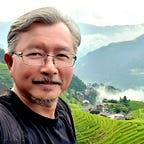Yellow Earth
Day Thirty
When I was in Wuhan eleven years ago, I made a phone call to an old friend Han who was head of a non-governmental organisation of the city when I first met him in year 2000. He was now higher up in the hierarchy in the city’s civic community leadership. He quickly invited me for dinner that evening to renew old ties. Over the Chinese wining and dining culture, the four of us (including his associates) enjoyed the fellowship of reminiscing the early years when we collaborated in the community projects in 2001 and also reflecting on the social changes taking place in 2011.
China had come a long way from the Open Door and Reform in 1978 to the Shanghai hosting the World Expo in 2010. As one who had successfully navigated the ups and downs, changes and challenges of China’s society, he valued relationships and friendships formed over the course of 5 decades. The Chinese are well-known for their prowess of forming relationships and keeping them, which they can call on to aid progress or overcome setbacks in their journey of life. Foreigners envy them for their social network but are also critical of these web of guanxi out of envy. The Chinese recognise this as part of being human.
Over our dinner conversations, we discussed Chinese movies and in particular, the movies of Chen Kaige, which set us talking about the cultural distinctives of the Chinese northerners vis-a-vis the southerners. The Yangzi River divides China geographically into the two halves geographically. As Wuhan is situated north of the Yangzi River, those who originated from Hubei province are naturally the geographic and cultural northerners. Han went on to wax lyrical about the cultural characteristics and personality traits of the northerners, including the ability to face the harsh climate and environment of the north.
We talked about Chen Kaige’s movie “Yellow Earth” (Huangtu) which was more like a slow documentary featuring village life in the dry and arid loess plateau across northern China, especially in Shaanxi and Shanxi provinces. Life on these highlands can be really difficult as almost no vegetation can grow on these desertified lands. The small subsistence farms were constantly ravaged by dryness and drought and famine ensued. Two great famine decimated millions in Shanxi and Shandong in the 19th century.
For centuries, those who were born there have tried to escape the claws of fate by wrangling out of the vicious poverty cycle. Those who left the community were driven by desperate needs for survival, the same motive behind most migration movements. It was a last roll of the dice to pursue a ray of hope for loved ones to have a better life on this earth. Those who survived the bandits and the harsh journeys, and made good eventually returned and helped rebuild their homes and communities. As the Chinese adage goes, no one will consider one’s mother ugly. The ties to family, clan and community are strong. The power of the collective human spirit to overcome can turn a wasteland into a treasure trove.
Chen Kaige once said that if there is a centre (heart) in the universe, it must be a heart of love. How else would you explain these inexplicable indomitable human spirit to love in spite of difficult situations? Once at a talk show on national television, after the film director Chen had shared his vision and passion for his movie “Yellow Earth” which had won great acclaim, a fan of his from the audience came forward with a gift for him. It was a vintage round metal film canister for holding film reels. As Chen opened up the canister, he saw it was full of yellow sand. The fan said this was yellow soil (huangtu) collected from Shaanxi yellow loess plateau. A fitting tribute to Chen for celebrating life on the difficult terrain. Tears welled up in Chen’s eyes.
“If I speak in the tongues of men and of angels, but have not love, I am a noisy gong or a clanging cymbal.” St Paul in his Ode to Love
Journey with me over 40 days as we reflect on life and hope in the wilderness
See previous reflection on Yellow Flowers. See next day’s reflection on Simplicity.
